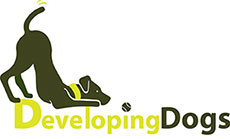It’s been a busy week here at Developing Dogs and at the back of my mind all week has been what topic to choose for my first official blog post on the new website. I’ve been collecting ideas, half formed thoughts and topics for a long time and had lots to choose from.
And then, over the last few days, this wonderful quote from Maya Angelou appeared in my Facebook feed a number of times, shared by friends who were clearly moved or inspired by the sentiments. It struck a chord with me too.
If you’re reading this you probably have more than a passing interest in dogs, and cannot fail to be aware of the tension in the dog training world between those of us who train using rewards, positive emotional states and the dog’s own motivations and those of us who also use those techniques to some extent but who believe that dogs also require corrections (whether physical or intimidatory), to be disciplined by humans as they would by their own kind in order to bring ‘balance’ to training and establish the correct hierarchy with the human at the top.
I make no secret in nailing my colours firmly to the mast of the first group. But, it hasn’t always been like that. I grew up in a time of Barbara Woodhouse (anyone from outside the UK reading this, she was a tv dog trainer in the 70s – think Cesar Millan meets Mrs Doubtfire) and my childhood dog was therefore subjected to choke chains, firm discipline and physical manipulation to get her to do what I wanted. And then, without me even realising, along came pack theory and I absorbed that like a sponge; believing and trusting the theory as if I’d always known it to be true. At the time of adopting my first dog as an adult I still carried the torch for pack theory.
But, I am what is known as a conscious consumer: I always want to know more. The internet was just starting to revolutionise the way we accessed information and I was reading about clickers, positive reinforcement, that pack theory was rejected even by those who had first proposed it.I found great classes and travelled across the country to learn from people who were at the forefront of this change. The desire know and understand more about this apparent revolution in training eventually led me to an MSc in Clinical Animal Behaviour, so that I could both evaluate the emerging science and apply it practically in training and behaviour.
So, I know better and I hope I also do better than I did 10 years ago. I haven’t stopped reading, evaluating, critiquing and learning just because I now have the qualification. I haven’t stopped developing ideas and techniques – I am an unashamed magpie when it comes to training. I will take good ideas from anywhere and incorporate them in to my toolbox. I hope that in another 10 years I can look back and continue to be proud of how far I’ve come and how I’ve adapted to work with people and dogs as the science moves on and challenges what we think we know. This is why we are called Developing Dogs. It signifies my commitment to continue to develop the way we live, work and love our dogs.
Dog training moves on – you want a trainer who moves on too.


Comments are closed.